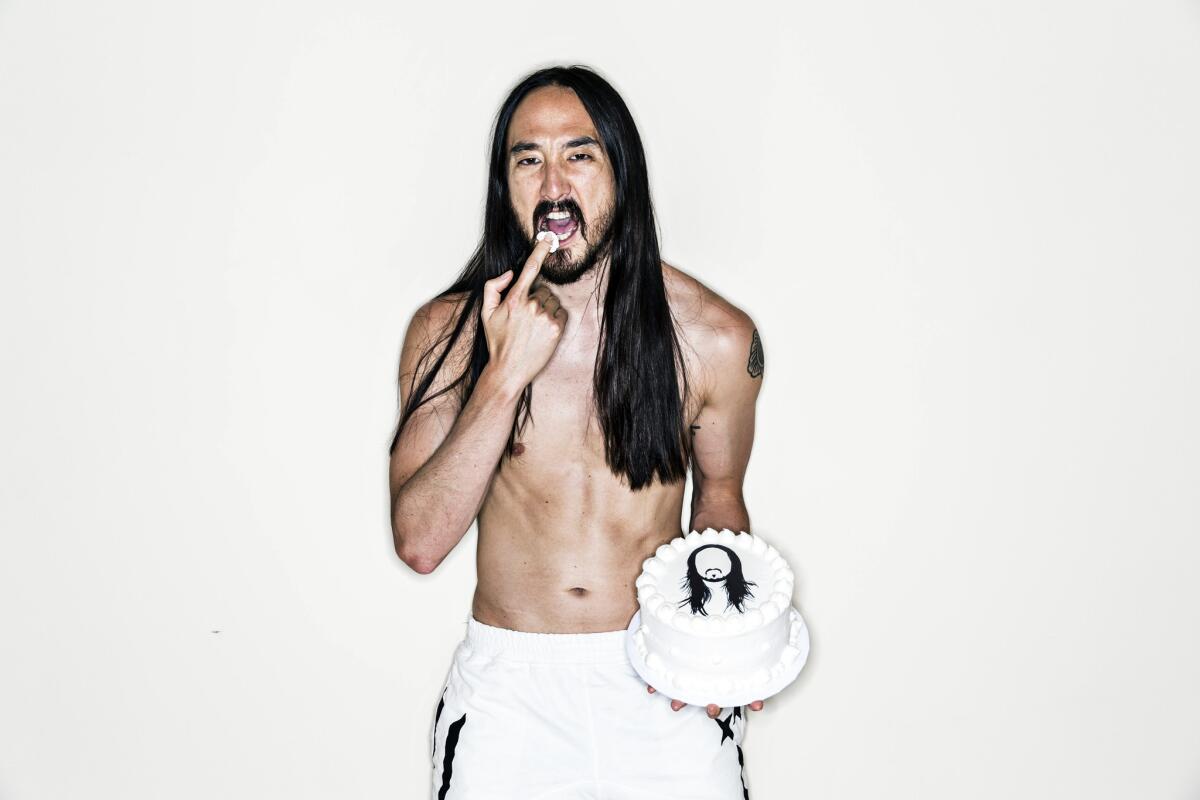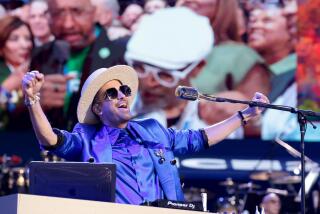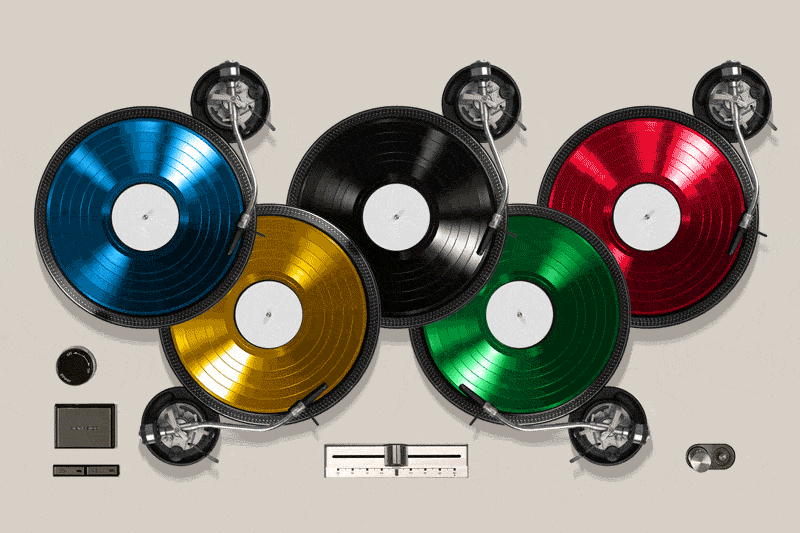DJ Steve Aoki balances decadent party image with business dreams

It was just past 2 a.m. on one of those “what happens in Vegas, stays in Vegas” Saturday nights, and a capacity crowd of more than 3,000 revelers inside the Strip’s epically proportioned nightclub Hakkasan Las Vegas were tripping the light fantastic. To the pummeling oontz-oontz-oontz of electro bass, they were dancing and drinking with hedonistic abandon when Steve Aoki decided it was time for cake.
A live wire in skinny jeans, the superstar DJ leapt from behind his turntables to a narrow ledge ringing the DJ booth, a vanilla-frosted layer cake the size of a small Boogie board poised for launch in his hand. Between signs bearing the messages “Please cake me” and “I need the cake,” Aoki spotted his quarry: a grinning twentysomething bro with outstretched arms.
The DJ hurled the cake, splattering the guy and everyone around him with enough of the sugary confection to provoke an ecstatic release that rippled through the crowd like electricity.
This was hardly a spontaneous gesture. Up to a dozen times each show, performing worldwide more than 225 days a year, Aoki flings cake at the crowd.
“Some people are like, ‘That’s so … wrong!’” Aoki explained earlier that night. “But I’m not caking people out of hate. It’s a love connection. Dance music is an emotional journey. It’s how well you can make people feel something that they haven’t felt.”
In a conversation laced with F-bombs, Aoki added, “The best part to me is post-cake. After the cake has hit their face, they turn around so the whole crowd can see: They’re on top of the … world!”
But as much as the scene at Hakkasan was business as usual for one of electronic dance music’s busiest touring acts — a DJ turned indie record label owner and music producer who earned his stripes as the rowdy figurehead for Los Angeles’ trend-setting dance music scene in the late-’00s — Aoki’s cake toss that night could also be viewed as a kind of opening salvo. As the performer embarks on a game-changing suite of new initiatives, he’s lobbing more than cake to change the shape of his career.
Cross-section collaboration
Late next month, Aoki will drop “Neon Future Vol. 1,” the most ambitious — and uncharacteristically intellectual — effort of his career. The first installment of a two-album collection focused on themes of futurism, evolving technology and scientific innovation, the record features Aoki’s synth-driven, rapid-beats-per-minute collaborations with a cross-section of modern musicdom including multi-platinum hitmaker Will.i.am, arena-rocking emo-pop quartet Fall Out Boy, Empire of the Sun singer Luke Steele and rapper Machine Gun Kelly.
“His stage show is mad crazy,” said rapper Kid Ink, who collaborated with Aoki on the track “Delirious (Boneless) ft. Kid Ink.” “We weren’t concerned about the words so much as just vibing and letting the words come to us by thinking about being in the club. What we would want to do in the club. We wanted to be instructional.”
Already, “Boneless (Delirious) ft. Kid Ink” has become Aoki’s biggest hit. It has sold more than 225,000 downloads, is getting major airplay on Top 40 radio stations across the country and has racked up nearly 24 million YouTube streams.
Meanwhile, a companion video series called “Neon Future Sessions” will likely upend expectations for the long-haired head-banger who sprays champagne on his audience as a matter of course. In the videos, Aoki interviews such techno-eminences as scientist-inventor Ray Kurzweil (behind the “singularity” theory that envisions the melding of human brains with supercomputers), author-theoretician Aubrey de Grey (whose books portend man’s ability to overcome the aging process) and digital media mogul Arianna Huffington, earnestly grilling them about the future in its myriad forms.
“Whenever I learn something, I want to share it,” Aoki said. “Now I’m in this position where I get to interview the futurists of today, the people involved with my main interests: artificial intelligence, brain research, technology.”
But it’s his family lineage as son of Rocky Aoki — the flamboyant, philandering, speedboat-racing founder of the Benihana restaurant chain — that grabbed the attention of David Gelb, filmmaker behind the documentary “Jiro Dreams of Sushi.” An as-yet-untitled documentary produced by Gelb (directed by his protégé, Justin Krook) chronicling Aoki’s complicated relationship with his father is set for theatrical release in January by Relativity Media.
Crossing the foyer of his new home, a 15,000-square-foot mansion with sweeping views of Las Vegas, Aoki grew nostalgic, recalling how little more than a decade ago he commanded just $50 a night for his DJ services and still viewed himself as an outsider. “I’m 36, but I still feel like a punk kid with $200 in my savings account,” Aoki said. “I feel like I stole this house! The [stuff] ain’t real, man.”
In June, Aoki traveled from Seoul, where he had performed before 35,000 people at Korea’s Ultra Music Festival, to Las Vegas, where he has lived since relocating from L.A. last spring. On touching down in the privately chartered plane he christened the #aokijet on his 1.2-million-followers-strong Instagram account, the DJ met with Tony Hsieh, chief executive of Zappos.com.
Personal crusade
Hsieh has made a personal crusade out of rehabilitating blighted downtown Las Vegas into a burgeoning hipster enclave. During their meeting at a funky outdoor shopping and entertainment center, the two discussed ways Aoki might help Hsieh, including potentially setting up a DJ school for kids or a pop-up store in conjunction with the performer’s Dim Mak record label and fashion line.
“He’s mellow, down to earth,” Hsieh said. “Right now, we’re just brainstorming things in the vein of ‘Wouldn’t it be cool if …’”
Contrary as it may seem to Aoki’s self-styled image as ringmaster to dance music’s decadent demi-monde of Molly pills and Patron shots, the entertainer established his earliest cultural bona fides in the SoCal hardcore and punk rock scene, where building community and fight-the-power politics speak louder than bling.
Growing up in affluent Newport Beach after his parents’ divorce, the musician was effectively cut off from his father’s Benihana fortune — estimated to have been worth as much as $100 million — thanks to the elder Aoki’s insistence that his six children attain success without his financial help. Still, the misconception the younger Aoki grew up a “rich kid” has dogged him ever since (not helped by Aoki’s early DJ moniker “Kid Millionaire”).
“Hardcore was about going to shows, singing unity lyrics and the DIY lifestyle,” he said, seated in the back of an Audi sedan speeding down Interstate 15. “The more you can bring creatively, the more respect you get. If you come in with Daddy’s money, they’re like, ‘Get the … out!’”
While enrolled as an undergrad at UC Santa Barbara, Aoki launched Dim Mak Records to release the kind of independent music he loved while also tirelessly writing critical pieces for hardcore fanzines and touring with his punk band, This Machine Kills.
After moving to Los Angeles in the early ‘00s, however, Aoki experienced an epiphany once exposed to the aggressive sound of acts such as MSTRKRFT and Justice that melded rock ‘n’ roll aggression to an electronic dance infrastructure. Learning to DJ specifically to bring the sound to a larger audience, Aoki began promoting raucous Hollywood party events and cultivated a following. “It was the punk rock of dance music,” explained Aoki. “And I was the ambassador for Los Angeles and bringing worldwide electro to L.A.”
Over time, the DJ transitioned into producing his own music, recording electro remixes of alt-rock artists signed to Dim Mak before releasing his debut solo album, “Wonderland,” in 2012. And as EDM remade the Top 40 in its own image, the performer emerged as one of its biggest draws.
Last October, Aoki landed at No. 8 on DJ Magazine’s Top 100 DJs, the highest-ranking American on the list. And that reputation is certainly born out by his summer performance schedule: a dual residency at Hakkasan and the notoriously decadent Pacha nightclub in Ibiza, Spain; a packed touring roster of big-footprint music festivals across Europe as well as Aoki’s bring-the-house-down set before a crowd of 130,000 at Las Vegas’ Electric Daisy Carnival in June.
An August date for Aoki to headline Madison Square Garden was postponed after the release of “Neon Future Vol. 1” was delayed, but according to Aoki’s management there’s been a bidding war between Brooklyn’s Barclays Center and Madison Square Garden to book Aoki. Meanwhile, Aoki will pull cross-country double-duty at Budweiser’s Made in America Festival, performing prime slots on back-to-back days in the fest’s Los Angeles and Philadelphia installments on Aug. 30 and 31.
Although Aoki declines to place a specific dollar value on his earnings as a resident DJ at Hakkasan, he ranks among the town’s top-earning EDM performers, whose marquee presence has revolutionized Las Vegas’ entertainment culture. Where nostalgia acts once ruled the Strip, dance music all-stars such as Calvin Harris, Afrojack and Hardwell have turned Vegas into a beacon for block-rocking beats with hundreds of millions of dollars in tourism revenue tied their bookings.
According to Nightclub & Bar Magazine, the top five Vegas clubs combined to bring in a staggering $335 million last year. And in a clear indication of how important EDM acts can be to the bottom line, casino tycoon Steve Wynn recently admitted to paying DJs who perform at his venues up to $400,000 a night.
“It’s not the ticket count on those gigs but the spend — all that pricey liquor that gets consumed — that’s important,” noted Gary Bongiovanni, editor of Pollstar magazine, which estimated Aoki’s tour earnings at $3.9 million last year without considering his summer music festival or nightclub residency earnings. “The value of money is already distorted in Las Vegas. That’s why you see so many EDM gigs and $1,000 bottles of champagne.”
Dr. Dre drops in to the show
As the clock wound toward 3 a.m., a menagerie of beautiful people and bold-faced names jostled for position near Aoki inside the Hakkasan DJ booth. Then several Tropic Beauty bikini modeling contestants and hip-hop icon/reality TV star Flavor Flav were suddenly displaced by a platoon of burly bodyguards. They hustled in none other than Dr. Dre. The gangsta rap trailblazer — who recently sold the company he co-founded, Beats Electronics, to Apple for a reported $3 billion — had come in from Los Angeles to see Aoki spin.
Just then, Aoki leapt out of the booth again to introduce another signature prop to the nightclub throng: an inflatable raft. He ordered his friend, the professional poker player/bon vivant Dan Bilzerian, into the river-rafting vessel, which was held aloft and passed along by dozens of clubgoers’ hands. Aoki innovated the gambit by manning the raft himself for his pandemonium-inspiring performance at the 2009 Coachella Valley Music and Arts Festival. But these days, although the raft comes out every show, he seldom takes the trip.
“It sometimes feels like that movie ‘World War Z,’” Aoki said with a hint of regret. “People climbing on top of each other. It got too intense.”
Still, not everyone in EDM is enamored of the performer’s stagecraft. In May, fellow producer-DJ Seth Troxler challenged Aoki in an invective-filled op-ed on Vice.com, calling him an “overpaid, untalented, cake-throwing performing monkey” — an attack that prompted soul searching.
“You see the comments come in: ‘Aoki’s a clown, a poser.’ I do feel a bit insecure about it,” Aoki admitted. “I thought, ‘Maybe I should stop caking.’ But then I thought, ‘I can’t let these people dictate the way I live.’ In this space, it’s all about the moment.”
After Rocky Aoki died in 2008, his children spent years locked in legal battle with the restaurateur’s widow, Keiko Ono, over his will. In May, a court awarded Steve and his supermodel half-sister, Devon, 50% each of a family trust that stipulates that when the siblings turn 45, they are set to inherit ownership rights to Benihana and substantial income from the restaurant chain.
For his part — having independently amassed a fortune of his own, in part thanks to his father’s unique brand of tough love — Steve Aoki has no plans to go on a wild spree with his inheritance. Instead he said he intends to maintain the business and views the court verdict as a victory for his family against the woman he says cut off Rocky from his children in his dying days.
Looking to the future, the superstar DJ grew introspective. He acknowledged that balancing his public image with his personal goals can be tricky.
“The crazy parties! The cake face! It does come across as ignorant fun,” Aoki said. “But I have this whole other aspect that I really want to expose — to show I’m not some dumb, spoiled brat. I want meaning in my life.
“I want to help the empowerment of whatever I’m doing,” he said. “I never want to be watching on the sidelines.”
More to Read
The biggest entertainment stories
Get our big stories about Hollywood, film, television, music, arts, culture and more right in your inbox as soon as they publish.
You may occasionally receive promotional content from the Los Angeles Times.











